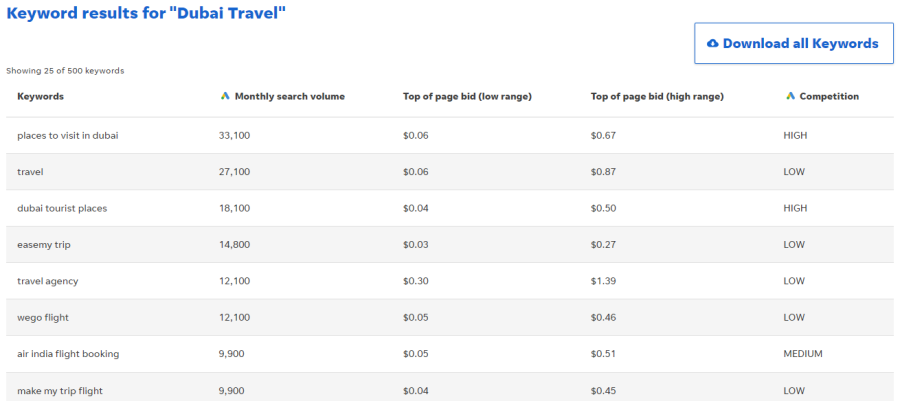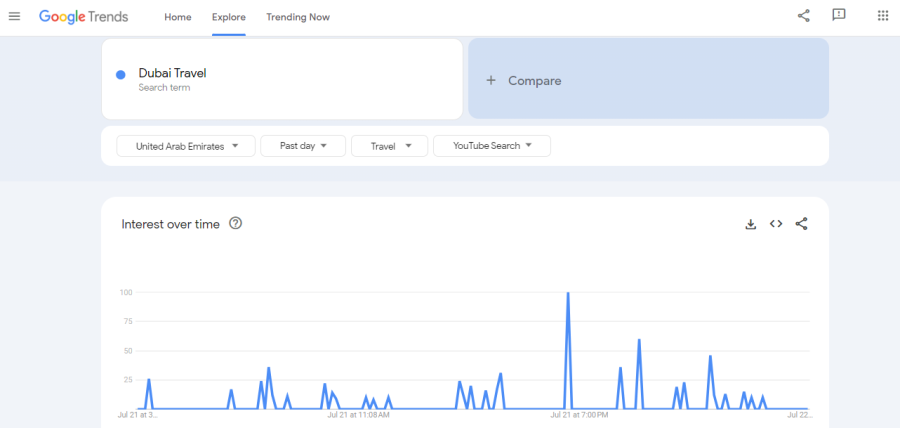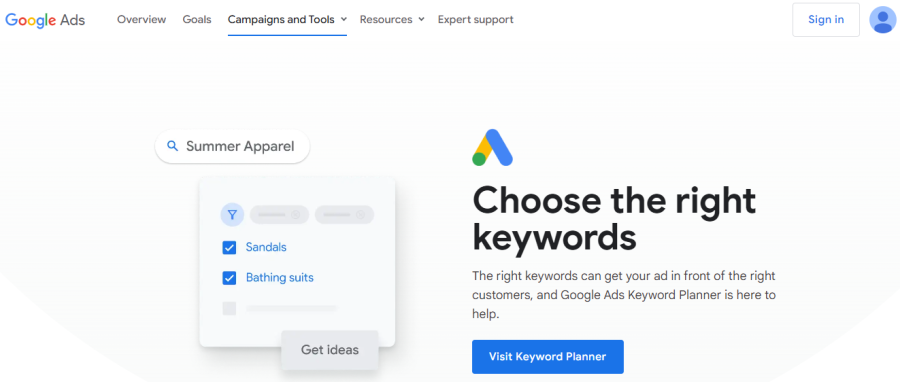Have you ever thought about how YouTube viewers find your content?
Typically, they find it by typing specific terms, called keywords, into the YouTube search engine. If your video matches or is relevant to those terms, YouTube will rank it higher up in the search results.
To rank for certain keywords, you must insert them throughout your video metadata. Metadata is the text that describes your video and mainly includes the title, description, tags, thumbnails, and captions.
But before you can place keywords, you have to know which ones to use. That’s where keyword research comes in!
Across the internet, you’ll find a wide variety of tools, both free and paid, that do the hard work of keyword research for you. In this article, we’re bringing you 15 of the best keyword research tools for YouTube that are available in 2024.
Before we delve in, let’s clarify the concept of YouTube keyword research.
What is YouTube Keyword Research?
When you research keywords, you’re looking for terms that users commonly enter in the YouTube search bar to find the videos they’re looking for.
If you learn what some of those terms are, you can include them in your video metadata to improve your chances of ranking higher in search results. The higher you rank, the more views you’re likely to generate. The entire process is known as YouTube keyword research, involving finding, analyzing, and selecting keywords for effective YouTube search engine optimization (SEO).
Let’s say, for example, you plan to make a video showing how to build a table. To research keywords related to this topic, you would enter the topic into a keyword research tool, and the tool would pull up dozens if not hundreds of results. These are the terms that users are searching for when they want to know how to build a table, and the terms at the top of the list are the ones that are being searched for the most.
Referring to this list, when selecting a YouTube keyword, consider relevance, search volume, competition, audience intent, and trends. Ensure the keyword aligns with your content, has a good search volume, manageable competition, and reflects current interests.
A keyword research tool is also helpful if you’re not sure what topic you want to make your next video about. Just research general topics that you’re interested in and see what popular keywords come up. Then base your video on those top search terms.
If you’ve never used a keyword research tool before and don’t know where to start, we’ve got you covered below!
Free YouTube Keyword Research Tools
To kick things off, check out the best YouTube keyword research tools that are free to use.
1. Ahrefs

Ahrefs is a free YouTube keyword research tool that not only gives you keyword ideas based on the term or topic you type in, but also ranks the results by search volume. Using this tool, you can tell at a glance which keywords would be most advantageous to use in your content, or as inspiration for a new video.
2. Wordstream

Wordstream provides you with hundreds of keyword ideas for free. All you have to do is type in your desired search term, select your industry, and indicate which state or country you want to target with your content. As well as search volume, you’ll also be able to see the top page bids that advertisers are offering for each keyword, and the level of competition for ranking in search results.
3. Google Trends

Google Trends is another free option that you can use to research popular keywords related to your content. Just enter a keyword or topic in the Explore bar, and see which topics and queries are related to it; how users’ interest in the topic has waxed and waned over the past few days; and which subregions in your country are searching for it the most.
4. Google Ads Keyword Planner

Marketers and advertisers traditionally use Google Ads Keyword Planner to plan advertisements. But you can also use it to perform keyword research for your YouTube channel! Once again, you’ll need to be logged into your Google account to use it. But other than that, it’s completely free. You only have to pay if you decide to deploy ads.
5. YouTube Studio

Did You Know You Can Research Keywords Directly From the YouTube Studio?
You can access this feature by logging into your YouTube Studio account and clicking Analytics on the left-hand menu. Then, underneath Channel Analytics, click the Research tab and type in your desired keyword, topic, or search term. YouTube will then tell you which keywords are relevant to your search and whether they have a high or low search volume.
6. Keyword Tool

Keyword Tool is a unique website that uses YouTube’s Autocomplete feature to expand whatever keywords you enter. Their method helps you generate literally hundreds of new video or keyword ideas.
The only downside is they don’t give you any other information, like search volume or trending ranks. That type of data is exclusive to Keyword Tool Pro subscribers.
7. Tuberanker

Tuberanker generates free lists of relevant keywords based on the initial keyword you type in. It also provides search volume data and an export feature, so you can save the list to your computer in your preferred file format.
Paid YouTube Keyword Research Tools
If you don’t want your keyword research limited to just one metric (or none at all), consider trying these paid YouTube keyword research tools.
8. Semrush

Semrush’s Keyword Magic Tool is aptly named. This magical all-in-one tool provides keyword suggestions that are optimized for SEO. Each keyword also comes with up to 12 metrics that include search volume, keyword difficulty, keyword intent, and a number of organic results. Once you’ve performed research for a given topic or keyword, Semrush allows you to save it in their Keyword Manager.
Cost: $129.95 Per Month (Pro Plan)
9. VidIQ

From discovering how popular certain search terms are on YouTube, to revealing a “universe” of keywords related to your topic of interest, VidIQ’s Keyword Research Tools suite does it all. It also comes with an autocomplete feature similar to YouTube’s, which will help you expand your keywords, as well as customizable keyword tag templates.
Cost: $39 Per Month (Boost Plan)
10. Tubebuddy

Tubebuddy’s Keyword Explorer helps you optimize your YouTube channel videos by generating high-scoring keywords related to your content niche. It also recommends the latest trends in your niche to you, so that you can use them for future video concepts and boost your engagement.
Cost: $26.39 Per Month (Legend Plan)
11. Buzzsumo

Buzzsumo is for the serious YouTube keyword researcher/marketer. Not only will their Content Ideas Generator feature let you explore SEO insights related to your channel and your desired keywords; but with the Basic plan, you can also monitor mentions of your brand, your content niche topics, and your competitors. You’ll even get access to a Buzzsumo Chrome extension!
Cost: $119 Per Month (Basic Plan)
12. KeywordSearch

The Keyword Research tool from KeywordSearch is the ultimate resource for optimizing your YouTube videos. It finds the best keywords for your target audience, shows incredibly detailed insights into each term, and uses the power of AI to suggest effective and relevant keywords that will boost your engagement.
Cost: $97 Per Month (Keyword Search Plan)
13. Keyword Keg

Explode into YouTube search results with Keyword Keg! This keyword research tool uses a YouTube Autosuggest API to help you come up with new long-tail keywords; generate several long lists of keywords at once using up to 30 seed keywords; and automatically categorize the results of your research by your audience’s intent.
Cost: $38 Per Month (SEO Freelancer Plan)
14. Keywords Everywhere

Keywords Everywhere is a Chrome browser extension that shows you the keywords listed on websites or in Google Search, along with important data like search volume, cost per click (CPC), competition, and historical trends. While not as comprehensive and detailed as other paid YouTube keyword research tools, it’s quick to install and super convenient to use, as it’s right there with you wherever you go on the internet.
Cost: $1 Per Month (Bronze Plan)
15. HyperSuggest

HyperSuggest doesn’t just suggest keywords that are relevant to your topic. It also shows you common related queries that your audience typically searches for; organizes your long-tail keyword lists automatically, so you don’t have to do it yourself; and helps you track your rankings on YouTube on a daily basis. It even analyzes your competitors’ SEO, so that you can stand toe to toe with the other creators in your industry.
Cost: $39 Per Month (Starter Plan)
3 Tips For Conducting YouTube Keyword Research Effectively
You can have the most comprehensive, most expensive keyword research tool that exists. But if you don’t know how to use it to optimal effect, it doesn’t matter how many features it comes with – it’s not going to help you rank your content and grow your channel. Here are three tips that will take your keyword research to the next level:
1. Start With a Seed Keyword
Rather than get super specific with your research, start with a seed keyword.
A seed keyword is a short, one or two-word keyword that describes your video topic or niche on a broad scale. It’s designed to help you discover a wider range of longer-tail keywords and sub-topics, which you can then use as content ideas or as tags for your existing videos.
2. Use the Metrics to Your Advantage
Metrics such as search volume, competition level, CPC, and trends data are crucial to helping you find the most effective keywords for your topic or seed keyword. Use them to your advantage, and to figure out which keywords will generate the most views for your video.
3. Pay Attention to Your Competitors
Sometimes, your competitors provide you with the most insight for keywords to use (and not to use). Analyze the other creators in your niche to find out which keywords they’re using to rank their content that’s similar to yours.
Bonus Tip: In addition to researching a topic or keyword, research-related or alternatively spelled versions of it, as well. This can help you catch a variety of keywords that users might type in to look for your content.
How To Extract YouTube Keywords From a Competitor’s Video?
Another way to perform keyword research is to extract the keywords from one of your competitor’s videos that’s similar to yours (or to a video you intend to create in the future).
To do this, you need a tool called a YouTube tag generator (or a YouTube tag extractor), which reveals the keywords that another creator uploaded as tags on their video. All you have to do is input the video’s URL into the tag generator, and it will produce the list of keywords you’re looking for. Here are the few examples of YouTube tag generators that are free to use on your mobile device:
Frequently Asked Questions
Which Keyword Research Tool is the Best One For YouTube?
There are many great keyword research tools out there, but Semrush is one of the best – not just in quality, but also in quantity of features.
How Do You Use YouTube Keywords Tools Properly to Get the Best Keywords?
Start by using seed keywords to generate as many long-tail keyword suggestions as possible. Then reference metrics like search volume, competition, and CPC to choose the best ones for your video.
Can Keywords Increase My Video View Counts?
The right keywords in your video metadata can help your video rank higher in YouTube search results. This, in turn, can result in a higher video view count.
Is There a Limit to How Many Keywords I Should Use Per YouTube Video?
You’re limited to three keywords total for your YouTube title, but you can use as many as you want in the description, providing they fit in the 5,000-character limit.
Is It Smart to Only Use Keywords That Are Low Competition?
It’s good practice to use low competition keywords wherever you can to help your videos rank higher. However, keep in mind that if the search volume for those keywords is extremely low, you may not get many views.
Is It Possible For An AI Tool To Generate YouTube Video Keywords?
Yes. You can use ChatGPT and similar AI text processing tools to generate YouTube video keywords.
Conclusion
Keyword research is the lynchpin of every successful YouTube marketing plan. When done right, it helps you build a subscriber base from the ground up, using mainly organic traffic. To get started with this strategy, though, you must have a good keyword research tool. It’s the best way to find the most optimal keywords that will drive traffic to your channel.
If your marketing budget is low, try starting out with one of the free tools on our list. As you grow, you can upgrade to a more professional, paid tools like Semrush or Buzzsumo.

